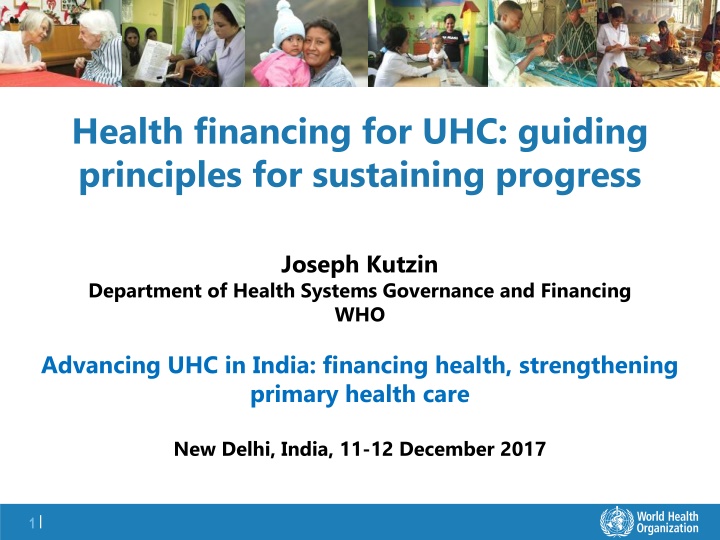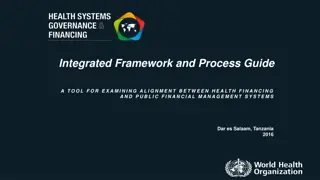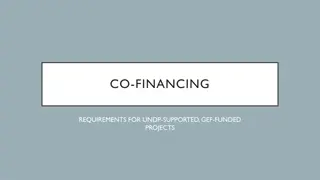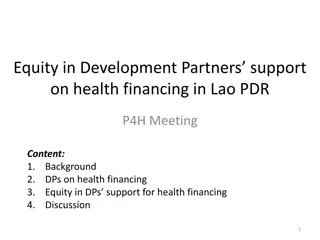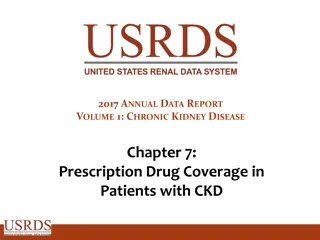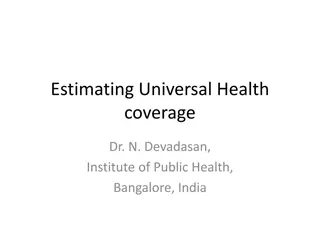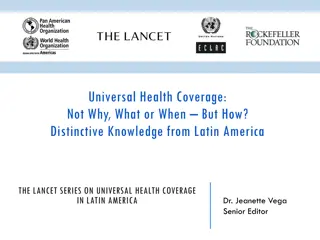Health Financing for Universal Health Coverage: Guiding Principles for Sustaining Progress
Promoting universal health coverage through sustainable health financing is crucial for ensuring access to quality healthcare services without financial hardship. This concept goes beyond mere financial reforms, encompassing various aspects of the health system to enhance service utilization, quality, and financial protection. Universal coverage necessitates strong governance to integrate all components effectively. Join the discourse on advancing UHC through strategic policy reforms and equitable healthcare delivery.
Download Presentation

Please find below an Image/Link to download the presentation.
The content on the website is provided AS IS for your information and personal use only. It may not be sold, licensed, or shared on other websites without obtaining consent from the author.If you encounter any issues during the download, it is possible that the publisher has removed the file from their server.
You are allowed to download the files provided on this website for personal or commercial use, subject to the condition that they are used lawfully. All files are the property of their respective owners.
The content on the website is provided AS IS for your information and personal use only. It may not be sold, licensed, or shared on other websites without obtaining consent from the author.
E N D
Presentation Transcript
Health financing for UHC: guiding principles for sustaining progress Joseph Kutzin Department of Health Systems Governance and Financing WHO Advancing UHC in India: financing health, strengthening primary health care New Delhi, India, 11-12 December 2017 1|
UHC: CONCEPT AND IMPLICATIONS FOR POLICY 2| Health financing for UHC. UHC Day Seminar New Delhi, 11-12 December 2017
Definition Enable all people to use needed health services (including prevention, promotion, treatment, rehabilitation, and palliation), of sufficient quality to be effective; Ensure that the use of these services does not expose the user to financial hardship - World Health Report 2010, p.6 Just a utopian aspiration? 3| Health financing for UHC. UHC Day Seminar New Delhi, 11-12 December 2017
Operationalize by converting into a set of UHC objectives No country fully achieves all the coverage objectives But all countries want to Reduce the gap between need and utilization (equity) Improve quality Improve financial protection Thus, moving towards Universal Coverage is something that every country can do practical orientation for policy reforms relevant to countries of all income levels 4| Health financing for UHC. UHC Day Seminar New Delhi, 11-12 December 2017
The concept also implies UHC needs more than health financing reforms Health financing policy directly affects financial protection (but so does medicines) Financing and other parts of the health system (service delivery, HRH, medicines, technologies) combine to influence service utilization Health financing is only a complementary instrument for influencing quality (service delivery, medical education/HRH, medicines, technologies, information) Health financing one part of overall health system; requires strong governance to fit all pieces together 5| Health financing for UHC. UHC Day Seminar New Delhi, 11-12 December 2017
What UHC brings to public policy on health coverage Coverage as a right (of citizenship, residence) rather than as just an employee benefit Critically important implications for choices on revenue sources and the basis for entitlement Unit of Analysis: system, not scheme (or program) Design and assess any scheme or program in terms of the effect on UHC goals considered at level of the entire system and population 6| Health financing for UHC. UHC Day Seminar New Delhi, 11-12 December 2017
HEALTH FINANCING FOR UHC 7| Health financing for UHC. UHC Day Seminar New Delhi, 11-12 December 2017
What health financing policy addresses This and also this: People Revenue raising Reforms to improve how the health financing system performs Pooling Purchasing Service provision Priorities and tradeoffs with regard to population, service, and cost coverage People 8| Health financing for UHC. UHC Day Seminar New Delhi, 11-12 December 2017
Three broad principles to guide health financing reforms for UHC Move towards predominant reliance on compulsory (i.e. public) funding sources Reduce fragmentation to enhance redistributional capacity and reduce administrative duplication Pools should be large, cover populations with diverse health risks, and involve mandatory/automatic coverage Towards strategic purchasing to align funding and incentives with promised services, promote efficiency and accountability, and sustain progress 9| Health financing for UHC. UHC Day Seminar New Delhi, 11-12 December 2017
Design systems to protect against financial risk Another link between health systems and economic development Health systems should be designed to protect individuals against potentially impoverishing effects of the need to pay for health care Need financing arrangements to limit exposure to direct out-of-pocket payment at the point of use 10| Health financing for UHC. UHC Day Seminar New Delhi, 11-12 December 2017
More govt spending on health means less dependence on OOP (but variation) Bubble size reflects relative per capita GDP INDIA WHO (2017). New Perspectives on Global Health Spending for Universal Health Coverage. Estimates for 2015.
Why public finance? Because its not anything goes on the path to UHC Cross-country evidence shows clearly that no country gets to UHC relying principally on voluntary prepayment Also consistent with health economic theory (concept of adverse selection) Issue is compulsory vs voluntary funding source, not public vs private ownership of finance or provision agencies For most low/middle income countries, this will mean general budget revenues (mainly indirect taxes informality) Private financing can be complementary, but only with clarity on what public funds will purchase
But no country can just spend its way to UHC focus on efficiency Strategic purchasing as a critical strategy for this linking the allocation of resources to providers to information on their performance and/or the health needs of those they serve while managing expenditure growth In practical terms, it means moving away from the extremes of (a) reimbursing all bills sent by providers, and (b) rigid input-based budgets unrelated to provider activity or performance 13| Health financing for UHC. UHC Day Seminar New Delhi, 11-12 December 2017
Chinas experience shows that more money alone is not enough Greatly increased public spending and insurance affiliation during the 2000s, but financial protection did not improve. Why? Provider payment by fee-for-service with no cap on overall reimbursements, and high co-payments Fee schedule overpays for high-tech diagnostics, under-pays labor time (e.g. for PHC consultation) Hospital admissions increased by 2.5 times Caesarean section rates jumped to 36% Health expenditure per capita grew at 4-5% faster than GDP growth out of control?? Meng et al (2012), household survey analysis published in The Lancet
Combining budget funds with pooling and purchasing to progress towards UHC Argentina combines performance-linked fiscal transfers to provinces with strategic purchasing to drive improvement in MCH use and outcomes Viet Nam fully subsidizes health insurance coverage for poor and vulnerable populations, funded from general tax revenues Japan and South Korea use strong IT systems to set prices and monitor service use to manage expenditure growth and provide incentives for priority services Chile links provider payment to explicit benefits
Related efficiency considerations for India s health financing policy Addressing bottlenecks in public financial management (PFM), for example Low budget execution Rigid rules that constrain managerial decision- making Input- rather than output-oriented accountability These limit ability to match budgets to priorities and to use financial incentives to drive efficiency gains 16| Health financing for UHC. UHC Day Seminar New Delhi, 11-12 December 2017
Summary messages for your consideration Strategic purchasing capacity can be key driver for reform but won t help unless effectively used Public funding is key to progress Accompany implementation with applied research to enable adaptation Link financing agenda to service delivery strategy Think through incentives in transfers to the states 17| Health financing for UHC. UHC Day Seminar New Delhi, 11-12 December 2017
